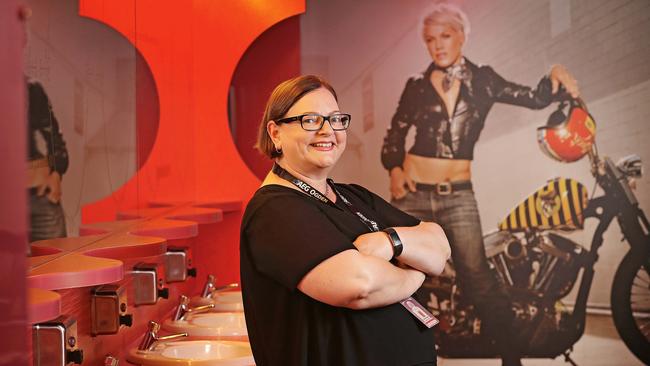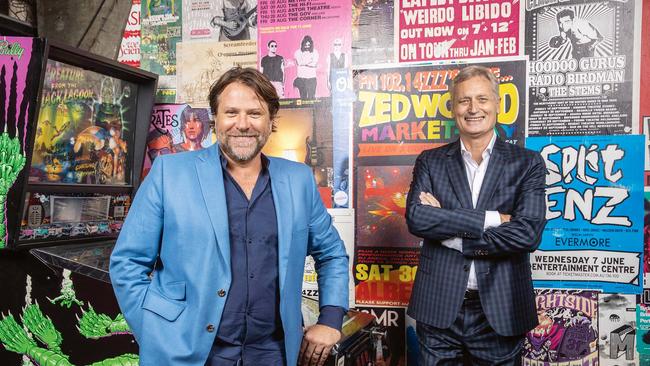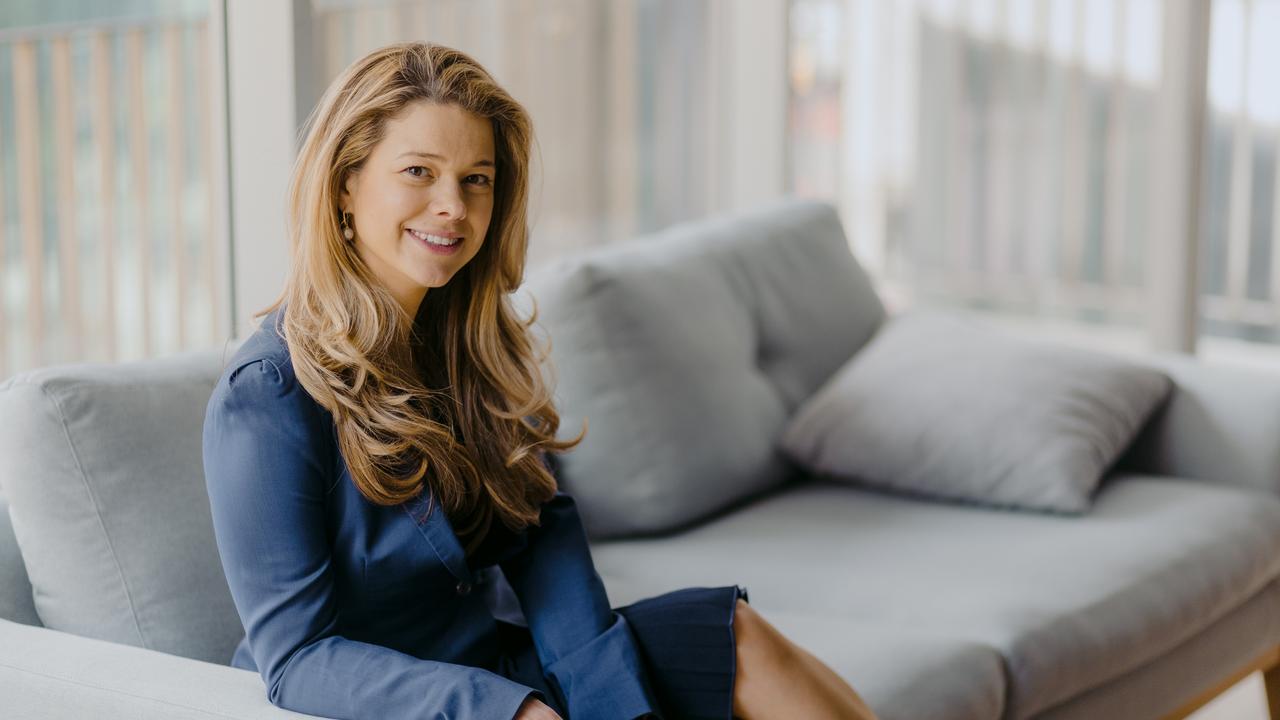Brisbane venues from the Ent Cent down
No act is too big for the Brisbane Entertainment Centre, but for those who can’t fill an arena, the city is full of vibrant venues.

The city’s biggest indoor live music venue is the Brisbane Entertainment Centre, 20km north of the CBD, which opened in 1986 as part of Brisbane’s unsuccessful bid to host the 1992 Olympic Games. As general manager Trish McNamara (pictured) explains while giving The Deal a tour, it’s booked this year by international artists including Fleetwood Mac, The Eagles, Post Malone and Elton John. Its capacity for in-the-round shows is 14,500, though 11,000 in concert mode is the most common configuration for touring artists.
Tucked away beside door six, however, is an unusual room that holds a special place in McNamara’s heart. “Most men have never been in here, so you’re going to get your first glimpse,” she says. “A highlight for me in this building is our Pink ladies’ toilets. We commissioned these for Pink (the American pop singer-songwriter born Alecia Moore), and opened them in honour of her 2009 tour. She did 11 shows here – the highest amount of shows a single artist has ever done here in one run – and she opened these toilets.”
Inside the brightly painted bathroom, key lyrics and photographs of the singer adorn the mirrors and walls, offset by a strip of pink overhead lighting and multi-coloured stall doors. “This toilet would be the most photographed toilet anywhere in the world,” says McNamara. “Most nights, we have a line for the toilets and a line for photos.”
Why toilets? “Why not?” she replies. “No-one had done it before. It seriously is one of my highlights.” The artist herself is clearly tickled by this unique honour. Last August, ahead of her fourth of seven shows at the Brisbane Entertainment Centre on her Beautiful Trauma tour, Pink posted a photograph on Instagram of her two children in the room with the caption: “Showing the kiddos mommy’s personal shitter”.
McNamara has worked at the venue since 1988 and her office is adorned with favourite concert posters, tickets and backstage lanyards. One of her prized possessions is a photograph with American country singer Dolly Parton.
The Brisbane Entertainment Centre is owned by the state under the Stadiums Queensland banner but it’s operated by AEG Ogden, a group which sprang from a long-running partnership between Harvey Lister and Rod Pilbeam, two friends who began a small company named Tour Promotions more than 30 years ago.
The pair did what that name suggests. At a time when the national concert promotion scene was far more dispersed than it is today, they would bid on running the Brisbane leg of Australian tours by acts such as Bruce Springsteen, Simon and Garfunkel and KISS. The promoters brought the talent into the country and Tour Promotions ensured that dates in the Queensland capital ran as smoothly as possible.
Lister and Pilbeam have operated the entertainment centre since it opened in 1986, and AEG Ogden has expanded to manage Brisbane’s Suncorp Stadium plus venues in Sydney, Perth and Darwin, as well as in Oman, Malaysia and Dubai.
Despite overseeing large entertainment spaces that regularly gross millions of dollars a night, the company remains highly supportive of the lower rungs of Brisbane’s live music business. “There’s a food chain there,” says Pilbeam, AEG Ogden’s chief operating officer. “If we don’t have the small venues providing the opportunities for new acts to be discovered, then nobody will ever get to the stage of being able to play our venues and attract a big enough audience. We thought The Triffid was a great step, but the Fortitude Music Hall (under construction in Fortitude Valley) will be fantastic. It’s right in the hole that we have in venue sizes. It won’t be what Festival Hall was back in the 1980s, because the scene’s different now. In fact, I suspect it will be better because it’ll be air-conditioned, it’ll have great toilets and good food and beverage services.”
AEG Ogden is behind another promising development named Brisbane Live, an indoor arena to accommodate about 20,000 people that is planned for the Roma Street railway station, close to the city centre. The business case has been presented to cabinet but depends on the funding of a major state government project named Cross River Rail. Like the Fortitude Music Hall, it would offer another option for concert promoters with about 16,000 seats in concert mode.
“It would be an outstanding addition to the Brisbane live music industry,” says McNamara. “It’ll be state-of-the-art – the best venue in Australia.” Pilbeam is optimistic too, although more circumspect. “It’s a little time away yet, but we’re reasonably encouraged,” he says. “It’s the next phase.”
-
Build it and they will rock: Fortitude Valley venue fills gap

Brunswick Street Mall is familiar to every Brisbane music act of note over the last four decades – from late 1970s upstarts such as punk forebears The Saints and indie-pop frontrunners The Go-Betweens, through to the alternative music boom of the 1990s led by Powderfinger, Regurgitator, Custard and Screamfeeder.
Following a public vote in 2008, these acts were immortalised in a “walk of fame” of bronze plaques embedded in the footpath. They sit alongside country musician Keith Urban and pop groups Savage Garden and The Bee-Gees. More recently, Violent Soho, Ball Park Music, Sheppard and DZ Deathrays have grown national audiences after years of performances in this densely populated area of the city.
Now, metres from the bars, restaurants and music rooms that make Fortitude Valley the noisy centre of Brisbane’s nightlife, work is underway to add something new to the city’s live entertainment landscape. In the mall’s busy pedestrian strip a vacant building has become a $43 million construction project for the Fortitude Music Hall. The expansive mezzanine is taking shape and a raised stage from August will host some of the most popular performers in world music in front of up to 3300 guests.
That’s a number that has been tough to match since Festival Hall – which hosted The Beatles, Led Zeppelin and Nirvana – made way for an apartment block in 2003. With American global entertainment giant Live Nation as a full financial partner, the new venue will fill a gap between The Tivoli, which holds about 1500 people, and the Riverstage, an outdoor venue attached to the city’s botanic gardens which can accommodate up to 9500 on its lush green hill.
“Brisbane lost an absolute essential when Festival Hall got skittled,” says the new venue’s co-owner, Scott Hutchinson. He notes that last year, David Byrne’s American Utopia shows saw the former Talking Heads frontman and his band play in Sydney, Melbourne and Adelaide – yet the Queensland concert was held 80km down the highway at the Gold Coast Convention Centre because there was no suitable venue in Brisbane.
“David Byrne played Adelaide and the Goldy, but not Brisbane – that’s a crime,” says Hutchinson, who isn’t joking. He’s dead serious about music, which he describes as “the only interest I really have” – other than Hutchinson Builders, the family company founded in 1912, of which he is chairman. Last financial year, its turnover was $2.7 billion, while the group returned a before-tax profit of $37.53m.
As a wealthy fan of live entertainment, Hutchinson is committed to making a lasting difference to his home town. “Everybody with resources often has their thing that they waste money on: opera, ballet, motor racing, football team, boats,” he says. “What better thing to waste money on than music venues that people can share?”
He and co-owner John Collins are linked through their shared love. The latter has written, recorded and performed music for much of his adult life as the bassist in Powderfinger – a quintet which never left Brisbane despite becoming one of the biggest rock bands in the country – before calling it quits in 2010.
This unlikely duo of builder and bassist has partnered once before on a music venue in the neighbouring suburb of Newstead. Since it opened in November 2014, The Triffid has become an integral part of the scene, thanks to its emphasis on quality sound design and engineering from the ground up. “I don’t have to be modest about it – it’s absolutely brilliant,” says Hutchinson, who is in effect the landlord of both buildings. Collins nods: “I’m really happy with The Triffid – if I wasn’t, I probably wouldn’t have been able to move onto the Fortitude Music Hall.”
Andrew McMillen is national music writer at The Australian




To join the conversation, please log in. Don't have an account? Register
Join the conversation, you are commenting as Logout